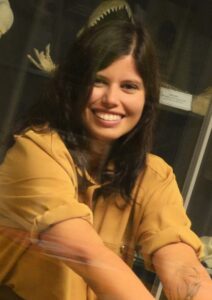9.2.2024
Doctoral thesis on the consequences of human activities in coastal ecosystems

M.Sc. Maïté Jacquot’s doctoral thesis in Environmental and Marine Biology will be put forth for public defence at the Faculty of Science and Engineering at Åbo Akademi University.
The thesis is entitled Human Ecosystem Engineering: Effects and feedback in coastal benthic systems.
The public defence of doctoral thesis takes place on Friday 16 February 2024 at 1PM in the auditorium Argentum, Aurum, Henrikinkatu 2, Turku. You can also follow the defence of the doctoral thesis online. Assistant Professor Laura L. Govers, University of Groningen, Netherlands, will serve as opponent and Docent, Senior Researcher Marie Nordström, Åbo Akademi University, as custos.
Summary:
In the quest to improve their living environment, humans are causing changes in ecosystems all over the world. This happens to the extent that humans can be considered an ecosystem engineer, i.e. a species with such an extensive impact on its environment that many other species and entire habitats are affected. As 2.5 billion people live within 100 km of the coast, a disproportionately large pressure is placed on coastal ecosystems, which are at the same time characterized by high ecological and economic values. As humans face challenges related to climate change, loss of biodiversity, and increasingly threatened ecosystems, there is a great need to understand human effects, as well as potential feedback processes, in the marine environment.
This thesis describes and investigates the consequences of human activities in coastal ecosystems through studies in three different areas: Sine Saloum in Senegal, West Africa, Åland in Finland, Baltic Sea, and Mobile Bay in Alabama, Gulf of Mexico. The thesis focuses on invertebrates living in the seabed sediments (benthic fauna), as well as associated ecosystem functions. In particular, functions related to the oxygenation of the seafloor, to nutrient fluxes, and to the role of the fauna as a central food resource for various predators and bottom-dwelling fish were studied.
In all of the three coastal ecosystems studied, benthic fauna were affected not only by the physical environment and sediment characteristics, but also by human activities, such as shellfish harvesting, fish farming, eutrophication and heavy metals. The results show that human activities affect the structure and diversity of benthic communities, which can lead to changes in ecological functions. The results in the thesis primarily provide a deeper understanding of human impact in coastal ecosystems, but also evaluate potential feedback to human society. To conserve marine ecosystem services, special attention should be paid to human activities that have consequences for coastal ecosystems.
Maïté Jacquot was born in 1991 in Longjumeau, France. She can be reached by phone +33 6 10 03 35 82 or email maite.jacquot@abo.fi.
The doctoral thesis can be read online through the Doria publication archive.
Click here for a press photo of the doctoral student.
Instructions on how to follow the doctoral defence remotely
To follow the defence, you need the Zoom software or the Google Chrome browser. You do not need to create a Zoom account to follow the defence. If you install the application, you participate by clicking on the meeting link, after which you should allow the link to open in the Zoom app.
